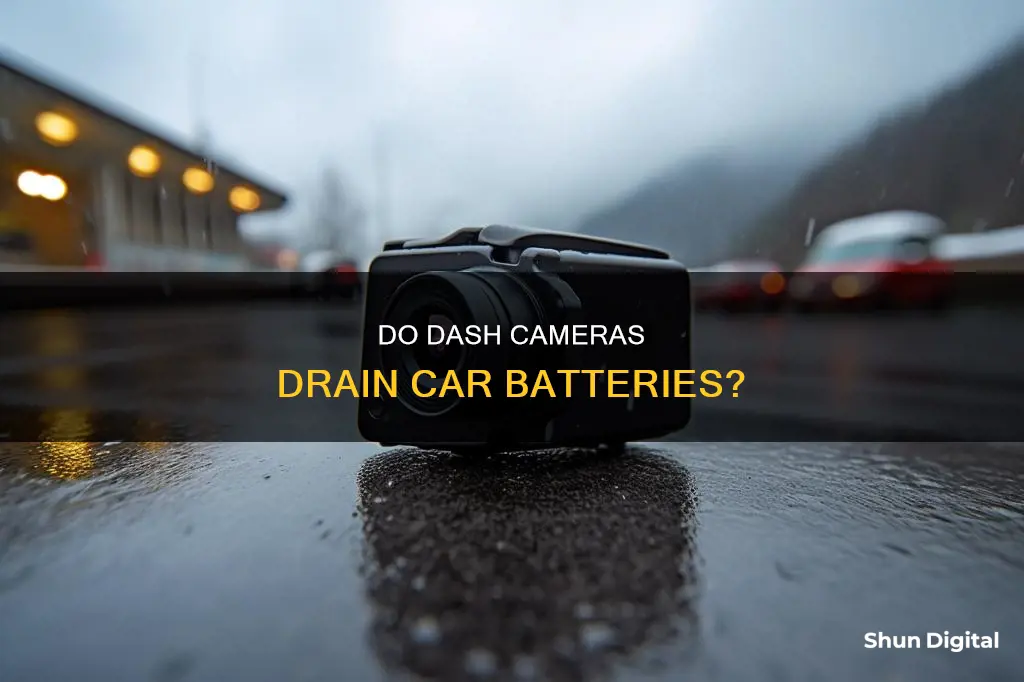
Dash cameras are a valuable tool for drivers, providing a second set of eyes on the road and serving as a deterrent to potential thieves or criminals. However, one common concern among car owners is whether dash cams can drain their car battery. The short answer is that it's unlikely for dash cams to drain your car battery while driving, as they typically use less than 5 watts when recording. The engine's alternator powers the dash cam, similar to how it powers the headlights and the radio. However, when the car is parked for an extended period, there is a risk of the dash cam draining the battery, especially if it's constantly recording or activated by motion detection.
| Characteristics | Values |
|---|---|
| Dash cams drain car battery | No, but it is possible under certain conditions |
| Conditions | Car is not running, dash cam is not hardwired, no external power source, old car battery |
| Dash cam power consumption | 1-5 watts during normal operation |
| Dash cam battery types | Internal batteries, capacitors, external battery packs |
| Preventing battery drain | Use a fuse tap, battery discharge prevention device, hardwiring kit, power bank, or power off when not in use |
What You'll Learn
- Dash cams use a small amount of power, but can drain a car battery if left on for too long
- Dash cams can be powered by internal, capacitor, or external batteries
- Hardwiring a dash cam can drain a car battery if not done correctly
- Dash cams can be powered by a dedicated dash cam battery pack
- Battery discharge prevention devices can be used to monitor dash cam battery voltage

Dash cams use a small amount of power, but can drain a car battery if left on for too long
Dash cams are a great way to keep an eye on your car, even when you're not behind the wheel. They can provide crucial evidence in case of accidents and enhance overall vehicle security. While they do draw power from your car's battery, they are designed to consume a very small amount—typically between 1 and 5 watts. This means that even when your car is off, a dash cam can run for a few days before completely draining your car's battery.
However, it's important to note that the amount of power consumed by a dash cam can vary depending on certain factors. For example, dash cams with parking mode, motion detection, or higher resolution recording capabilities can use more power. Additionally, older or weaker car batteries are more susceptible to draining issues. Extreme temperatures can also affect battery performance and increase power consumption.
To prevent your dash cam from draining your car battery, there are several things you can do. Firstly, consider using a dash cam with low power consumption and set it to turn off automatically when your car is turned off. You can also invest in an external battery pack or a dedicated dash cam battery, which will provide a separate power source for your dash cam when your car is off. Another option is to hardwire your dash cam directly to your car's fuse box, but this requires careful management to avoid draining the battery. Using a fuse tap with the correct fuse rating and a battery discharge prevention device is crucial.
In summary, while dash cams do use a small amount of power, they should not significantly drain your car battery if used properly. By following the tips mentioned above, you can enjoy the benefits of a dash cam without worrying about battery drain.
Car Dealership Surveillance: Cameras and Your Privacy
You may want to see also

Dash cams can be powered by internal, capacitor, or external batteries
Dash cameras are a great way to keep an eye on your vehicle and the road, even when you're not driving. They can provide valuable evidence in the event of an accident or incident. However, one concern for car owners is whether dash cams will drain their car battery.
The good news is that dash cams typically use very little power, usually between 1 and 5 watts, and they don't affect your car battery while driving. This is because the engine's alternator powers the dash cam, just like the headlights and the radio.
But what about when the engine is off? This is where the type of power source for your dash cam comes into play. There are three main options: internal batteries, capacitors, or external battery packs.
Internal batteries allow the dash cam to operate for a short period when the car is off. They are useful for capturing footage when the engine suddenly cuts off, such as in a road accident. However, they have limited capacity and are not suitable for long-term recording.
Capacitors are a more durable and heat-resistant option. They can provide enough power to save the last recording before shutting down, making them ideal for hot climates. Like internal batteries, capacitors are not designed for long-term power.
If you're looking for long-term power, especially for "Parking Mode", an external battery pack is a better option. These battery packs charge while you drive and then power the dash cam when the car is off, reducing the load on your car battery. However, they require regular charging and can be more expensive.
So, if you're concerned about your dash cam draining your car battery, consider the power source. Internal batteries and capacitors are great for short-term power, while external battery packs are better for continuous recording when the car is off.
Troubleshooting MSI Computer Camera Issues
You may want to see also

Hardwiring a dash cam can drain a car battery if not done correctly
Hardwiring a dash cam can be a convenient way to ensure it is always ready to record. However, if not done correctly, it can drain your car battery.
Dash cams are a valuable tool for drivers, providing a second set of eyes on the road and offering protection when the car is unattended. While they typically use very little power (5 watts), the concern of battery drain is understandable, especially when the car is parked for extended periods.
When hardwiring a dash cam, it is crucial to use the correct installation techniques to avoid battery drain. One method is to use a dual wire kit, with one wire for power and the other for ground, connected to a fuse that charges when the car is on. This setup ensures the dash cam turns off when the engine is off, preventing battery drain.
However, another method uses a three-wire kit, with one wire for constant power, one for car battery power, and one for ground. This setup could drain your battery if the camera is continuously powered when the car is switched off. To mitigate this, some dash cams offer parking modes that help save battery power by only activating the camera when motion or impact is detected. Additionally, buffered parking mode allows the camera to record without writing to the memory card, saving images to internal memory, which also reduces battery usage.
It is important to note that some dash cams have a built-in voltage monitoring system or low-voltage cutoff, which automatically shuts down the camera if the car's battery is running low. This feature provides an additional safeguard against battery drain.
In summary, while hardwiring a dash cam can drain your car battery, proper installation techniques, voltage protection, and parking modes can help prevent this issue.
Bus Camera Tickets: Moving Violations or Not?
You may want to see also

Dash cams can be powered by a dedicated dash cam battery pack
The engine's alternator powers the dash cam and charges the battery pack while you drive. This way, the battery pack can run the dash cam while you're parked without relying on the car's battery. This prevents the dash cam from draining your car's battery and causing it to wear out prematurely.
Some dash cam models, such as the BlackVue Battery Pack (B-112) or Ultra Battery (B-124X), come with their own dedicated battery packs. These battery packs charge when you drive and keep your dash cam powered once the ignition is off.
If you're considering a battery pack to power your dash cam, it's important to choose one that is compatible with your dash cam model and has sufficient battery capacity to meet your needs. It's also important to properly install the battery pack to ensure that it is connected to a constant power source and not the car's ignition switch.
Overall, using a dedicated dash cam battery pack is a safe and effective way to power your dash cam while also protecting your car's battery.
Mastering Auto Focus: Galaxy Note 4 Camera Tips
You may want to see also

Battery discharge prevention devices can be used to monitor dash cam battery voltage
Dash cams are a great way to keep an eye on your car, even when you're not behind the wheel. They can provide crucial evidence in case of accidents and enhance overall vehicle security. However, a common concern among car owners is whether dash cams can drain the car battery.
Dash cams typically consume between 1-5 watts during normal operation, and even less in Parking Mode. While this is unlikely to drain your battery, it is still important to consider the impact on your battery, especially if you plan to use Parking Mode frequently.
One way to ensure your dash cam doesn't negatively impact your battery is by using a battery discharge prevention device. These devices monitor the battery voltage and automatically cut off power to the dash cam if the voltage drops too low. This ensures that your car battery maintains enough charge to start the vehicle.
Battery discharge prevention devices are especially important if you are hardwiring your dash cam directly to the fuse box. Hardwiring provides a continuous power supply to the dash cam, but it requires careful management to avoid draining the battery. By using a battery discharge prevention device, you can have peace of mind that your car battery will not be drained, even with continuous power draw.
In addition to using a battery discharge prevention device, there are a few other tips to prevent battery drain. Regular maintenance and timely replacement of your car battery are crucial. Keeping your battery in good condition, such as through regular cleaning of the battery terminals, can help prevent potential issues related to battery drain.
Another option to consider is investing in an external battery pack designed for dash cams. External battery packs charge while you drive and provide a separate power source when the car is off, reducing the load on your car battery.
By understanding how dash cams draw power and using the right installation techniques, such as hardwiring with a battery discharge prevention device, you can enjoy the benefits of a dash cam without worrying about battery drain.
Understanding Camera Raw Measurements: Unlocking Photography's Power
You may want to see also
Frequently asked questions
The short answer is no, it's very unlikely. Dash cams typically use less than 5 watts when recording, and even less when they're in Parking Mode. However, if your car is in the "on" position but the engine isn't running, your dash cam will help drain your car battery faster.
Parking Mode is when the dash cam is active and recording while your car is off. This is useful for monitoring your car when it's unattended.
There are several ways to prevent your dash cam from draining your car battery:
- Use a dash cam with a low power consumption rate.
- Set your dash cam to turn off automatically when your car is turned off.
- Install a dash cam with a built-in voltage cutoff system.
- Regularly check your car battery's voltage level.
- Use a hardwiring kit to connect your dash cam directly to your car's electrical system.
- Use a power bank to provide an external power source for the dash cam.







